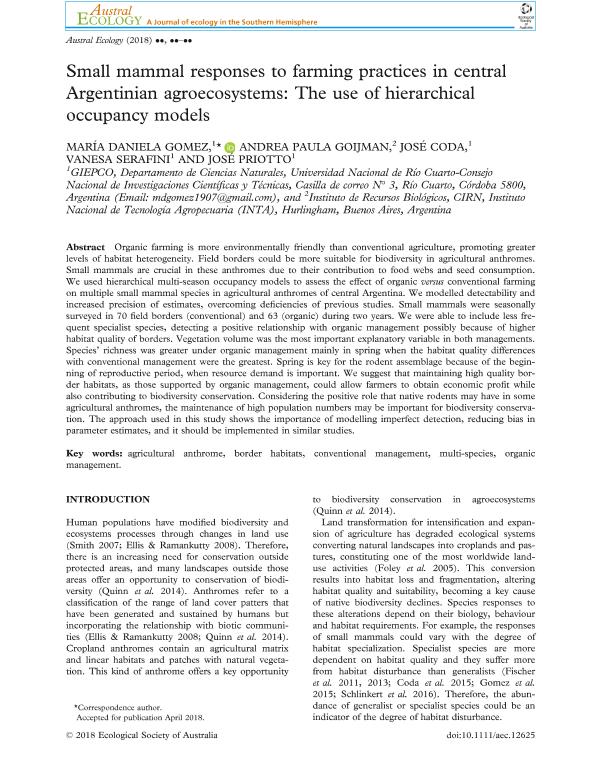Mostrar el registro sencillo del ítem
dc.contributor.author
Gomez, Maria Daniela

dc.contributor.author
Goijman, Andrea Paula

dc.contributor.author
Coda, José Antoni
dc.contributor.author
Serafini, Vanesa Natalia

dc.contributor.author
Priotto, Jose Waldemar

dc.date.available
2020-02-27T15:30:50Z
dc.date.issued
2018-11
dc.identifier.citation
Gomez, Maria Daniela; Goijman, Andrea Paula; Coda, José Antoni; Serafini, Vanesa Natalia; Priotto, Jose Waldemar; Small mammal responses to farming practices in central Argentinian agroecosystems: The use of hierarchical occupancy models; Wiley Blackwell Publishing, Inc; Austral Ecology; 43; 7; 11-2018; 828-838
dc.identifier.issn
1442-9985
dc.identifier.uri
http://hdl.handle.net/11336/98511
dc.description.abstract
Organic farming is more environmentally friendly than conventional agriculture, promoting greater levels of habitat heterogeneity. Field borders could be more suitable for biodiversity in agricultural anthromes. Small mammals are crucial in these anthromes due to their contribution to food webs and seed consumption. We used hierarchical multi-season occupancy models to assess the effect of organic versus conventional farming on multiple small mammal species in agricultural anthromes of central Argentina. We modelled detectability and increased precision of estimates, overcoming deficiencies of previous studies. Small mammals were seasonally surveyed in 70 field borders (conventional) and 63 (organic) during two years. We were able to include less frequent specialist species, detecting a positive relationship with organic management possibly because of higher habitat quality of borders. Vegetation volume was the most important explanatory variable in both managements. Species' richness was greater under organic management mainly in spring when the habitat quality differences with conventional management were the greatest. Spring is key for the rodent assemblage because of the beginning of reproductive period, when resource demand is important. We suggest that maintaining high quality border habitats, as those supported by organic management, could allow farmers to obtain economic profit while also contributing to biodiversity conservation. Considering the positive role that native rodents may have in some agricultural anthromes, the maintenance of high population numbers may be important for biodiversity conservation. The approach used in this study shows the importance of modelling imperfect detection, reducing bias in parameter estimates, and it should be implemented in similar studies.
dc.format
application/pdf
dc.language.iso
eng
dc.publisher
Wiley Blackwell Publishing, Inc

dc.rights
info:eu-repo/semantics/openAccess
dc.rights.uri
https://creativecommons.org/licenses/by-nc-sa/2.5/ar/
dc.subject
AGRICULTURAL ANTHROME
dc.subject
BORDER HABITATS
dc.subject
CONVENTIONAL MANAGEMENT
dc.subject
MULTI-SPECIES
dc.subject
ORGANIC MANAGEMENT
dc.subject.classification
Conservación de la Biodiversidad

dc.subject.classification
Ciencias Biológicas

dc.subject.classification
CIENCIAS NATURALES Y EXACTAS

dc.title
Small mammal responses to farming practices in central Argentinian agroecosystems: The use of hierarchical occupancy models
dc.type
info:eu-repo/semantics/article
dc.type
info:ar-repo/semantics/artículo
dc.type
info:eu-repo/semantics/publishedVersion
dc.date.updated
2020-02-19T18:05:24Z
dc.identifier.eissn
1442-9993
dc.journal.volume
43
dc.journal.number
7
dc.journal.pagination
828-838
dc.journal.pais
Reino Unido

dc.journal.ciudad
Londres
dc.description.fil
Fil: Gomez, Maria Daniela. Consejo Nacional de Investigaciones Científicas y Técnicas; Argentina. Universidad Nacional de Río Cuarto. Facultad de Ciencias Exactas, Fisicoquímicas y Naturales. Departamento de Ciencias Naturales; Argentina
dc.description.fil
Fil: Goijman, Andrea Paula. Instituto Nacional de Tecnología Agropecuaria. Centro Regional Buenos Aires; Argentina
dc.description.fil
Fil: Coda, José Antoni. Universidad Nacional de Río Cuarto. Facultad de Ciencias Exactas, Fisicoquímicas y Naturales. Departamento de Ciencias Naturales; Argentina. Consejo Nacional de Investigaciones Científicas y Técnicas; Argentina
dc.description.fil
Fil: Serafini, Vanesa Natalia. Consejo Nacional de Investigaciones Científicas y Técnicas; Argentina. Universidad Nacional de Río Cuarto. Facultad de Ciencias Exactas, Fisicoquímicas y Naturales. Departamento de Ciencias Naturales; Argentina
dc.description.fil
Fil: Priotto, Jose Waldemar. Consejo Nacional de Investigaciones Científicas y Técnicas; Argentina. Universidad Nacional de Río Cuarto. Facultad de Ciencias Exactas, Fisicoquímicas y Naturales. Departamento de Ciencias Naturales; Argentina
dc.journal.title
Austral Ecology

dc.relation.alternativeid
info:eu-repo/semantics/altIdentifier/url/https://onlinelibrary.wiley.com/doi/full/10.1111/aec.12625
dc.relation.alternativeid
info:eu-repo/semantics/altIdentifier/doi/http://dx.doi.org/10.1111/aec.12625
Archivos asociados
